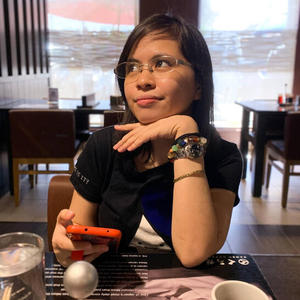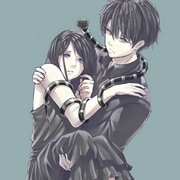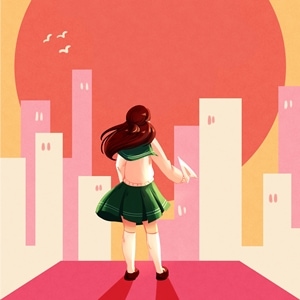THE NEXT THING I knew, I was screaming.
Beads of sweat trickled down my face as all energy felt drained out of my body.
Panting, I looked around. The air conditioning hummed monotonously as I sat up on the cold white sheets of an infirmary bed. I was in my gym clothes, a white shirt with St. John’s Academy’s patch stitched in green and a pair of black jogging pants that were slightly too long for me.
Then, I remembered: I passed out during PE when we were running laps around the gym. The feeling was, well, not pretty at all.
I had always been physically weak, but I strive to not let that hinder me. Our regular PE coach would go way too easy on me. After knowing about my condition—the hard way, if I may add—he would often direct me to the bleachers, even if he wouldn’t make us do much in class. So when a substitute walked through the doors one fateful day, I found an opportunity standing there just waiting to be grabbed.
Unfortunately, that was what got me into the school clinic all over again, surrounded by cupboards of medicines and ointments that I didn’t know the names of.
Despite the circumstances, I was relieved. For a minute there, I thought that whole thing with Cassandra and the hellish forest was real. My nightmares often had that kind of effect on me, making me feel unsafe and uneasy. Hence, there was comfort in finally waking up and finding myself in a familiar place.
As I slowly regained my composure, the clinic door opened, and a tall redhead entered the room. He was in the same PE uniform as I was, but instead of jogging pants, male students wore jersey shorts. He carried his bag over his shoulder and approached me with a wary expression.
“Hey, Quinn.” He sat on the chair next to my bed. “Glad you’re up. How are you feeling?”
I swatted his hand away as soon as he placed it on my forehead. “Cut it out, Curtis,” I chuckled. “For the millionth time, I don’t have a fever.”
He smirked. “Well, you seem pretty hot to me.”
I sighed. When you get to a certain level of friendship with someone, jokes like that were inevitable. I often rolled with it, but Curtis’ arsenal of bad puns was often a source of ambivalence for me.
Laughing bitterly, I placed a hand on my neck, felt my temperature—see, rolling with it—and frowned.
“I don’t think so,” I said, “but I still feel a bit dizzy…”
Curtis pulled out a water bottle from his bag and handed it to me. “I bet you’d want a drink by now, huh?”
I accepted—because why not? I was thirsty.
“Yeah, thanks.” I handed the bottle back to him. “So, how was class?”
He then drank and slumped in his chair. “Nothing but the same, mundane things,” he began. “A lot of running, panting, going deaf with Coach Sanchez’s whistle…”
Now this was usually the part where Curtis would change the topic. He would pull out his phone which would always have his earphones wrapped around it.
“Hey! There’s something I want you to check out,” he would then say.
If I were right, the next step would involve plugging an earphone in my ear and another in his. Then, he would turn on his phone’s music player, and I would be instantly flooded by the melody of an indie rock tune.
And that was what exactly happened.
In the clinic, Curtis was silent, engrossing himself in the wailing guitars and the beating drums. He only spoke again when the song’s chorus commenced.
“Isn’t it great?” he beamed.
He then went on with a bunch of musical terms I couldn’t comprehend and recall. His words were lost in his enthusiasm, and I couldn’t help but notice how much his eyes sparkled when he talked about the importance of… harmony? At least I thought it was harmony.
Curtis was always like that when he’d find a song he really, really liked. Even though I didn’t have a mutual affinity to the tracks he would make me listen to, it was just nice to see him so happy and passionate about music: the thing he cared about most of all.
But I was conflicted. Sure, Curtis was my friend, but I still wasn’t at that level where I could share everything with him. The fact that he was always so cheerful made him somewhat mysterious, like there was a side of him that I was yet to see.
So I just sat there as I thought about how often Cassandra appeared in my dreams. Since she’d stolen the spotlight in them, there were certain nights when I would opt to stay awake. The method proved to be effective until I began seeing her in the corner of my eye, lingering in the hallways and on bathroom mirrors.
“Hey, Quinn.” Curtis tapped on my shoulder. “Are you okay?”
It was then I realized that I had gone blank. I hated when I did that.
“Yeah,” I said.
But Curtis didn’t seem convinced. I could tell by the way he squinted his eyes and wrinkled his nose.
“I dunno, Quinn,” he scratched his head. “I couldn’t help but notice that you do that a lot.”
“Do what?”
“Well, you’ve been spacing out a lot lately. Is something wrong?”
Curtis would ask that question in many separate occasions, and with each time he did, I would never get to answer. The thing was, however, I wasn’t supposed to. For the past couple of months, Curtis was probably the most normal thing in my life. I couldn’t ruin that, but of course, I didn’t know any better.
I was saved from uttering a word when the door to the clinic swung open, and a girl came charging toward me.









![[Excerpts] The Metropolis Series](https://us-a.tapas.io/sa/6b/f0bed7b6-2324-4efb-a28e-80590efe6099_z.png)

Comments (0)
See all